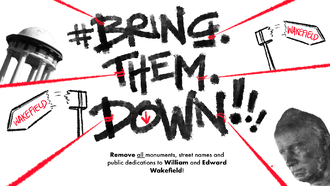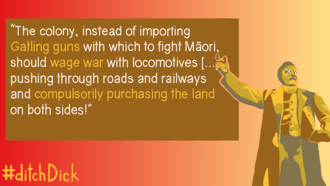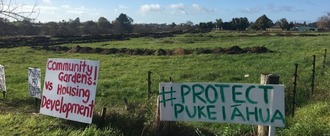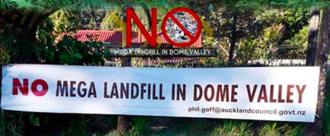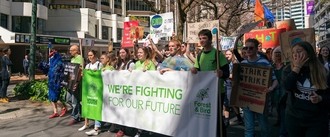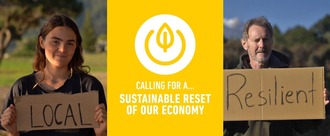-
Don't Exclude Lake Horowhenua From Freshwater PolicyLake Horowhenua near Levin is a taonga. Despite it's awful treatment over decades - sewage, stormwater and other run off from the land pouring into its water- this is a place we treasure and have long wished to clean up. The Government is introducing new new rules for the protection of freshwater in our streams, awa (rivers) and roto (lakes). There are some really good things in the new rules, for example caps on the use of synthetic fertiliser. They also put in place greater protection measures for wetlands, as well controls on the soil and sediment allowed to enter waterways.[1] However, we are deeply concerned that you, as Minister for the Environment, are considering leaving Lake Horowhenua out of the new rules, which would allow the lake to be polluted even further. It is clear you consider it 'too hard' to protect the health of the Lake - despite the water being so toxic that a Niwa scientist said in 2012 a small child could die if enough was swallowed. [2] The suggestion that the Horowhenua and Pukekohe be exempted because they grow 30% of our vegetables isn’t a good enough reason, when a change in farming practices, away from overuse of fertilisers etc., could address this (and is important for our overall environmental sustainability.) In fact, we are deeply distressed and angered that there have been talks to allow this type of unsustainable farming to continue - especially as we face worsening climate change. Lake Horowhenua deserves all the care of other lakes. The Waitangi Tribunal found in 2017 the Crown had breached Te Tiriti o Waitangi by being complicit in the pollution and environmental degradation of the lake and for you to exclude it would breach the Treaty further. It is a terrible precedent to set that when a lake has been polluted then we can just forget about it, let it become a dump.This is a slippery slope that we urge you not to go down. Instead, we ask that you put your full weight behind measures to clean up Lake Horowhenua and the region’s other waterways, and to progress more sustainable farming measures in both named regions. Iwi and local communities would then be able to swim in the lake and rivers again, and local farmers would be supported for meeting the best standards for healthy and sustainable practices. We are asking you as Minister for the Environment not to exclude Lake Horowhenua from your National Policy Statement for Freshwater Management, due to be finalised this year. The questions raised by your intended actions: Why would the Minister decide this when the lake is treasured? Why, when no one, including hapū and iwi, were properly consulted? Why when there is more money than ever available for storm and wastewater systems and "jobs for nature" from Government in the Covid-19 budget? Why when we know we can do better, that even in our horticultural operations that use what they call "luxury N" - extra nitrogen that is not necessary for growing vegetables but just makes veges look extra green when they hit the shelves - can and should reduce their impact, without risking our supply of veges. Why would the Minister do this when he knows our land can (and should for its own health) put in place better soil conservation methods - his Ministry has just done work on protecting productive land. Why would the Minister exempt any waterway when the freshwater policy does not even put a deadline on reaching bottom lines? Why would the Government okay this when at the same time it is spending millions on "cleaning up" the same lake? Please, Minister Parker, we ask that you immediately include the two exempted regions (Horowhenua and Pukekohe) in the National Policy Statement for Freshwater Management, and consult with local iwi and communities to clean up the lake and insist on more sustainable farming practices in the region. Join us in calling for Lake Horowhenua to be included in the National Policy Statement for Freshwater Management, along with the waterways and aquifers of Pukekohe. References 1. Lake Horowhenua pollution exemption will not help restoration efforts, iwi says, Stuff, July 2020 https://www.stuff.co.nz/environment/300056712/lake-horowhenua-pollution-exemption-will-not-help-restoration-efforts-iwi-says 2. Lake Horowhenua toxic enough to kill a child, Stuff, 2012 http://www.stuff.co.nz/environment/6390665/Lake-Horowhenua-toxic-enough-to-kill-a-child Why? When the lake is treasured. https://www.stuff.co.nz/environment/118169959/where-we-used-to-swim-lake-horowhenuas-health-a-testament-to-peoplemade-pollution Why? When no one, including hapū and iwi, were consulted. https://www.stuff.co.nz/environment/300056712/lake-horowhenua-pollution-exemption-will-not-help-restoration-efforts-iwi-says Why? When there is more money available for storm and wastewater systems from your Government. https://www.stuff.co.nz/environment/122062256/new-fund-will-pave-way-for-multibillion-dollar-overhaul-of-water-sector Why? When we know we can do better, even in our horticultural operations that use "luxury N" - extra nitrogen that is not necessary for growing vegetables but just makes veges look extra green when they hit the shelves. Why? When our land can (and should for its own health) put in place better soil conservation methods. https://www.nzherald.co.nz/nz/news/article.cfm?c_id=1&objectid=12035548 Why? When the policy does not put a deadline on reaching bottom lines. https://www.mfe.govt.nz/action-for-healthy-waterways Why? When you are spending millions on "cleaning up" the same lake! https://www.nzherald.co.nz/water/news/article.cfm?c_id=362&objectid=12346368 On breaching the Treaty https://www.stuff.co.nz/national/94246816/crown-left-horowhenuas-muaupoko-iwi-virtually-landless-breaching-treaty-of-waitangi?rm=m1,553 of 2,000 SignaturesCreated by Mandy Hager
-
End Systemic Racism in New Zealand SchoolsThe education system's purpose should be to nurture and support children, unfortunately this is not the case. Not all children are treated equally in our current system. Countless children have experienced racial abuse in the New Zealand education system, this disturbing problem has persisted for decades with little to no improvement. The effects of racial abuse on children has been well documented in academic literature. The Ministry of Education has been negligent in their response to the problem and have failed to protect vulnerable children from racial abuse. https://www.renews.co.nz/endless-stories-of-racism-in-nz-schools/ Testimonies of racial abuse victims will be included with this petition. Testimonies of racial abuse can be emailed to [email protected] or @ngati_frybread on Instagram. If you sign this petition please also consider to writing your local MP with your thoughts on this kaupapa. https://www.parliament.nz/en/mps-and-electorates/members-of-parliament/ We can make change, ngā mihi!4,969 of 5,000 SignaturesCreated by Ngati Frybread
-
Remove 'Waitangi Day' from the Waitangi Day Circle Line Pub Crawl event name & cancel the drunk HakaThis is important because the inclusion of Waitangi Day in the pub crawl title enables and perpetuates the dishonouring of Te Tiriti o Waitangi and is culturally insensitive. It also provides (and has done so on many accounts) an opportunity for intoxicated pub-crawl-goers to try to perform the Haka while wasted. The Pub Crawl (that has been going for 37 years) encourages New Zealanders in the UK to drink a lot of alcohol and 'celebrate' Waitangi Day by dressing up as 'kiwi icons' (eg. beer brands and marmite) and hop from one British Pub to another. As well as this, photographs have long-ago emerged of people trying to imitate traditional Māori Korowai, Tipare and drawn-on Moko Kauae poking out tongues and attempting pukana. Does this enhance mana? Does this contribute to British & European people seeing Haka performed incorrectly in London and therefore enables more terrible 'performances' of Ka Mate and Tika Tonu? Does the use of Waitangi Day by a non-Māori lead organisation and community respect the pain, loss and struggle Māori people have endured and still fight for when it comes to Te Tiriti and the reclamation of land, reo and culture? Related links: The Spinoff Article - There's something off about the Waitangi Day Pub Crawl by Madeleine Chapman https://thespinoff.co.nz/atea/06-02-2019/theres-something-off-about-the-london-waitangi-day-pub-crawl/ NZ Herald Article - Pleas for drunk Kiwis to abstain from haka during London Waitangi Day Pub Crawl by Michael Neilson https://www.nzherald.co.nz/nz/news/article.cfm?c_id=1&objectid=12305813 Te Ao Tapatahi Interview with Creator of Petition - Ashley Clark https://www.facebook.com/watch/?v=2957233182201501,424 of 2,000 SignaturesCreated by Ashley Clark
-
#BringThemDown - William and Edward Wakefield monuments, street names and public dedications.Edward and William Wakefield were imprisoned for three years in England for abducting a 15 year-old girl. Edward established and William led the New Zealand Company which swindled land out of Māori hands and promoted the systematic colonisation of Aotearoa. Currently, there is a bronze bust of Edward Wakefield at Mt Victoria, a concrete structure at the Basin Reserve dedicated to William Wakefield, Wakefield Street, and other public dedications. We must stop elevating colonial narratives like these because in doing so, we condone them. We must elevate the kōrero of tangata whenua. These must be removed. Further reading: [1] https://i.stuff.co.nz/national/politics/opinion/121823266/racism-monuments-and-ethical-remembering [2] https://nzhistory.govt.nz/people/edward-wakefield [3] https://nzhistory.govt.nz/people/william-wakefield [4] https://www.stuff.co.nz/national/121812546/two-monuments-to-sexual-predators-and-colonisers-could-be-scrapped-in-wellington [5] https://www.stuff.co.nz/dominion-post/news/wellington/111973644/wellington-places-named-after-controversial-historical-figures-could-be-renamed [6] https://www.tvnz.co.nz/one-news/new-zealand/new-zealands-colonial-statues-engulfed-in-controversy?fbclid=IwAR2mPikxToRhr2orN89s5bwCNeoGWfPHRAj9m-ZoK8q4C0O_dDD01754OJ0 [7] https://www.rnz.co.nz/news/national/418937/controversy-over-nz-colonial-statues-long-standing [8] https://youtu.be/iwclRJ2VC6A1,800 of 2,000 SignaturesCreated by Te Matahiapo Safari Hynes

-
Remove the Statue of Dick Seddon from Parliament Lawn“A nation reveals itself not only by the men it produces but also by the men it honours, the men it remembers.” - John F. Kennedy #DitchDick is a campaign petitioning the New Zealand government to remove and replace the statute of Richard “King Dick” Seddon which currently stands in front of the New Zealand Parliament Buildings. Dick Seddon was an established and notorious autocrat, imperialist and racist, and his beliefs are totally incompatible with the values of Aotearoa New Zealand as a just and modern nation. Seddon actively opposed the enfranchisement of women, supported racist policy against Chinese people, supported widespread confiscations and coercive purchase of Māori land and attempted to invade and annex the Pacific nations of Fiji, Sāmoa and the Cook Islands, succeeding in the latter. We call upon the government to relegate Richard Seddon to the history books and no longer honour him with pride of place in front of the highest legislative body in the nation. Seddon’s abhorrent words and deeds have no place in modern New Zealand, and there are many other great Kiwis who deserve the coveted place on Parliament lawn far more than he. References and further reading: -Grimshaw, Patricia. Women's Suffrage in New Zealand. Auckland University Press/Oxford University Press, 1972. xx, 151 pp. -Scott, Dick (1975). Ask That Mountain: The Story of Parihaka. Heinemann. -Burdon, Randal Mathews (1966)."Seddon, Richard John". In McLintock, A.H. (ed.). An Encyclopaedia of New Zealand.453 of 500 SignaturesCreated by Nikau Wi Neera

-
#protectpukeiāhuaUPDATE: Our petition was formally read and tabled in Parliament on 28th July 2020. Recently, the Māori Affairs Committee invited us to make a written submission on our petition by early February. We have several projects kicking off soon, including a neighbourhood parakore initiative, school and community tours, and master planning for Pukeiāhua. *** Pukeiāhua Pā in Ngāruawāhia is a historic Māori settlement with great cultural, archaeological and educational value to hapū and the local community. Over three hundred years ago, during a feast held at Pukeiāhua Pā, Ngāti Tamainupō chief Ngaere spoke these words: "Wāhia ngā rua - Break open the food pits." This is the story of how Ngāruawāhia was named, a narrative carried by each and every resident and business who call this place 'home'. According to hapū research, over 140 borrow pits or 'rua' were part of the extensive gardens making up Pukeiāhua Pā. Sadly, most of these 'rua' have been destroyed due to development, and only seven remain today. These 'rua' are located on the proposed site for a new subdivision. An Archaeological Authority for the proposed subdivision was approved on 25th March 2020, a day before lockdown. Due to an "administrative" error, Ngāti Tamainupō were not notified properly as mana whenua, nor provided with an opportunity to appeal the Authority. Excavation began on-site on 6th May 2020. The next day, concerned hapū and community members turned up in protest to stop further digging. The developer has agreed to stop all works onsite for now, however we need local and central government to come to the table with a solution that will protect this whenua for the whole community. Instead of high-cost housing, we envisage a greenspace that sustains the narrative of Ngāruawāhia as a cultural, heritage and ecotourism location; a place for community gardens and edible forests; and a space for whānau and tamariki to learn, relax and play together. We believe this is a dream worth fighting for, a dream worth uniting for. Sign the petition to ask the Government and Waikato District Council to protect this whenua for good and return it to mana whenua and the community as a reserve. https://www.youtube.com/watch?v=9mrEmuxSUxo&feature=emb_logo4,572 of 5,000 SignaturesCreated by Kimai Huirama
-
No Dump in Dome Valley - Protect Kaipara MoanaThe current Dome Valley Landfill Application is focused on meeting the current needs of Auckland City Council’s waste requirements, without regard to Mana Whenua and our special relationship to the Whenua and local community It is the position of Ngāti Whātua that the landfill proposal in its current form will cause irreversible damage to Papatūānuku and pose significant ongoing risks to the sustainability and mauri of the Hoteo River, Kaipara Moana our whenua and the broader environment. We must consider the long-term environmental outcomes, and the first step for protecting the future of the Kaipara Moana is to consider sustainable waste solutions. We ask the Council to halt all discussions with Waste Management NZ and as a Treaty partner provide our Iwi the opportunity to co-create a partnership that will assist our communities to manage waste in a way that puts Papatūānuku and our community at the center of decision making. Ko au te Kaipara - Ko Kaipara Moana ko au Ngāti Whātua ask for national support for this kaupapa and are seeking tautoko/support from all Uri, whānau, hapū, marae and tribal partners to sign our national petition and put forward a submission which closes 11.59pm Tuesday 26th May. To make a submission and to learn more about the Iwi national campaign visit https://www.ngatiwhatua.iwi.nz/dome-valley Listen to locals share their concerns about the pending environmental disaster this proposed dump will bring to the community and the Kaipara Harbour https://www.youtube.com/watch?v=NYklFdyCW0I We acknowledge the efforts of Fight the Tip, Save the Dome who have been fostered strong community opposition https://www.facebook.com/FightWMSavethDome/ National Press Release - Council ignores their obligations to Mana Whenua https://www.scoop.co.nz/stories/AK2005/S00530/auckland-council-ignores-obligations-to-mana-whenua.htm4,588 of 5,000 SignaturesCreated by Te Rūnanga o Ngāti Whātua
-
Make Matariki a public holidayIn May, Prime Minister Jacinda Ardern said that more public holidays is among a number of things the government is “actively considering” to encourage domestic tourism. With many small businesses struggling to keep their doors open, more public holidays to encourage folks to spend their disposable income exploring our beautiful country is a fantastic idea. Matariki is a time to gather with friends and whānau to remember those who have passed, to reflect on the year that has been, and to celebrate new beginnings. If Matariki were made a permanent public holiday, it would provide communities with an opportunity to learn about the Maramataka (Māori lunar calendar), connect with the elements and honour those who have passed away. A public holiday would foster understanding and celebration of Māori knowledge and wisdom and invite us to slow down our busy lives and share kai with the people we love. A recent poll, crowdfunded and commissioned by ActionStation members, has revealed that the majority of people in New Zealand believe Matariki should be a public holiday. Now is the time to make it so. 🌟🌟🌟 LEARN MORE: https://thespinoff.co.nz/politics/13-07-2020/the-people-have-spoken-we-want-a-matariki-public-holiday/35,254 of 40,000 SignaturesCreated by Laura O'Connell-Rapira

-
End Youth HomelessnessDuring Covid-19 young people experiencing homelessness have been at increased risk. There has been no coordinated, or youth specific strategy to provide for the needs of young people, and no housing made available to specifically meet their needs. We know that young people are over-represented in the homeless community, with young Maori, and rainbow youth, disproportionately affected. We know that there is limited safe, secure and suitable accommodation for young people experiencing homelessness. We know that - due to limited resources - Youth Housing services are having to turn hundreds of young people away. Yet, our nation has no youth specific strategy - and has provided limited resources - to meet the needs of some of the most vulnerable members of our community. If you are a young person, and you experience homelessness in New Zealand, your options for finding emergency accommodation are low. If you're 16-17yr's old, your chances get even bleaker. With the gains made during COVID19 for our homeless community we have an opportunity as a nation to end rough sleeping in Aotearoa for ever. However, to end homelessness, we must first End Youth Homelessness. To do this, we need your help. Manaaki Rangatahi call on Aotearoa, and the NZ Government, to join with us to #EndYouthHomelessness. Will you sign the petition and support the call and help us to #EndYouthHomelessness? You can read more about Youth Homelessness here: Youth Homelessness is Hidden Homelessness: https://www.stuff.co.nz/national/116095068/the-hidden-homeless-alarming-child-and-youth-homelessness-in-auckland If we truly want to end homelessness, we need to start here: https://www.noted.co.nz/currently/currently-social-issues/nz-ending-homelessness-starts-with-helping-young-people7,855 of 8,000 SignaturesCreated by Aaron Hendry
-
Put nature at the heart of the COVID-19 recoveryNature is on the verge of collapse. New Zealand has 4000 species in trouble, polluted waterways and a damaged marine environment; only transformative economic and policy decisions can restore and sustain our planet and our people. The rebuilding of our society after the impacts of COVID-19 provides us with a chance to restore our natural environment for both current and future generations.416 of 500 SignaturesCreated by Forest & Bird Youth

-
COVID19: Re-set Our Economy SustainablySustainability has been at the forefront of New Zealand’s news, our elections, and spurred hundreds of thousands of kiwis to peacefully protest. Despite this, and the extremely urgent message science is giving us, there has been a distinct lack of action. COVID19, in an unexpected and undesirable way, has given us the opportunity to re-set. Our new normal does not mean going back to the ways we know are broken. Our new normal means re-setting how we live, work, produce and govern in a way that regenerates. To start to heal what we have done while living outside the biophysical limits of the Earth. This gives us, future generations and other species a fair chance. It will help prevent, and be more resilient to, future crises. This disruption is a time to re-think systems and unite business, government and NGO's. Unlike ever before, we have the means and motivation to collaboratively and fairly transition our economy for a sustainable future. It's clear that if this opportunity is not navigated properly, with courageous and informed decision making, the future we are borrowing from our Mokopuna (Grandchildren) will not be a bright one. The decisions now will make our bed for decades to come and they must be the right ones. Our Leaders have a moral, and legal (Paris Agreement), responsibility to create a strong, resilient, local economy that regenerates Papatūānuku (Mother Earth) and fosters actualised human wellbeing.3,023 of 4,000 SignaturesCreated by Shay Lawrence - CaliWoods

-
Invest in a healthy and flourishing planet for our future - a covid responseThe Government has shown a commitment to COVID-19 recovery and have indicated that it will make significant investment in infrastructure. To protect the planet and protect our future, it is important that this investment does not lock us further into the high-emission pathway we are on, as such investments will accelerate the climate and ecological breakdown. The Government has tasked the Infrastructure Industry Reference Group to present it with projects that are ready to start within six months. The projects that are selected will be pivotal in determining our future! We are afraid for our ecosystems, animals and people that projects which lock us into a high-emission and ecologically unsustainable pathway will be selected. To prevent this, and to achieve a future that is connected to a healthy and flourishing planet, we need to urge the Government to invest in transformation climate change projects. Further examples of possible projects include restoring our ecosystems, enhancing walking and cycling routes, and green tech innovations. Please sign this petition if you want to call on Government to invest in a healthy and flourishing planet for our future. Government seeks infrastructure projects https://www.beehive.govt.nz/release/government-seeks-infrastructure-projects200 of 300 SignaturesCreated by Hannah Riley

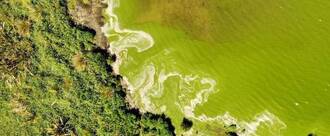
.jpg)

